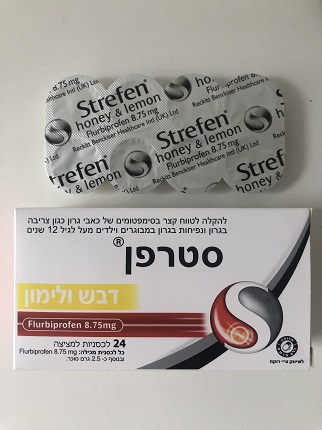Quest for the right Drug

סטרפן דבש לימון STREFEN HONEY AND LEMON (FLURBIPROFEN)
תרופה במרשם
תרופה בסל
נרקוטיקה
ציטוטוקסיקה
צורת מתן:
פומי : PER OS
צורת מינון:
לכסניה : LOZENGES
עלון לרופא
מינוניםPosology התוויות
Indications תופעות לוואי
Adverse reactions התוויות נגד
Contraindications אינטראקציות
Interactions מינון יתר
Overdose הריון/הנקה
Pregnancy & Lactation אוכלוסיות מיוחדות
Special populations תכונות פרמקולוגיות
Pharmacological properties מידע רוקחי
Pharmaceutical particulars אזהרת שימוש
Special Warning עלון לרופא
Physicians Leaflet
Interactions : אינטראקציות
4.5 Interaction with other medicinal products and other forms of interaction Flurbiprofen should be avoided in combination with: Other NSAIDS including Avoid concomitant use of two or more NSAIDs as this may increase cyclooxygenase-2 the risk of adverse effects (esp. gastrointestinal adverse events such selective inhibitors: as ulcers and bleeding), (see section 4.4). Acetylsalicylic acid (low Unless low-dose aspirin (not above 75mg daily) has been advised by dose) a doctor, as this may increase the risk of adverse reactions (see section 4.4). Flurbiprofen should be used with caution in combination with: Anticoagulants: NSAIDs may enhance the effects of anti-coagulants, such as warfarin (see section 4.4). Anti-platelet Agents Increased risk of gastrointestinal ulceration or bleeding (see section 4.4). Antihypertensive drugs NSAIDs may reduce the effect of diuretics and other (Diuretics, ACE antihypertensive drugs may enhance nephrotoxicity caused by inhibitors, angiotensin- inhibition of cyclooxygenase, especially in patients with II-antagonists): compromised renal function (Patients should be adequately hydrated) Alcohol May increase the risk of adverse reactions, especially of bleeding in the gastrointestinal tract Cardiac glycosides: NSAIDs may exacerbate cardiac failure, reduce GFR and increase plasma glycoside levels - adequate control and, if necessary, dose adjustment is recommended Ciclosporin: Increased risk of nephrotoxicity. Corticosteroids: May increase the risk of adverse reactions, especially of the gastrointestinal tract (see section 4.3) Lithium: May increase serum levels of lithium – adequate control and, if necessary, dose adjustment is recommended Methotrexate: The administration of NSAIDs within 24 hours before or after administration of methotrexate may lead to elevated concentrations of methotrexate and an increase in its toxic effect. Mifepristone: NSAIDs should not be used for 8 – 12 days after mifepristone administration as NSAIDs can reduce the effect of mifepristone. Oral antidiabetics Alteration of blood glucose levels reported (increased check rate recommended) Phenytoin May increase serum levels of phenytoin – adequate control and, if necessary, dose adjustment is recommended Potassium sparing Concomitant use may cause hyperkalaemia diuretics Probenecid Medicinal products that contain probenecid or sulfinpyrazone may Sulfinpyrazone delay the excretion of flurbiprofen. Quinolone antibiotics Animal data indicate that NSAIDs can increase the risk of convulsions associated with quinolone antibiotics. Patients taking NSAIDs and quinolones may have an increased risk of developing convulsions. Selective serotonin Increased risk of gastrointestinal ulceration or bleeding (see section reuptake inhibitors 4.4). (SSRI's) Tacrolimus: Possible increased risk of nephrotoxicity when NSAIDs are given with tacrolimus. Zidovudine: Increased risk of haematological toxicity when NSAIDs are given with zidovudine. No studies so far have revealed any interactions between flurbiprofen and tolbutamide or antacids.

שימוש לפי פנקס קופ''ח כללית 1994
לא צוין
תאריך הכללה מקורי בסל
לא צוין
הגבלות
לא צוין
מידע נוסף
